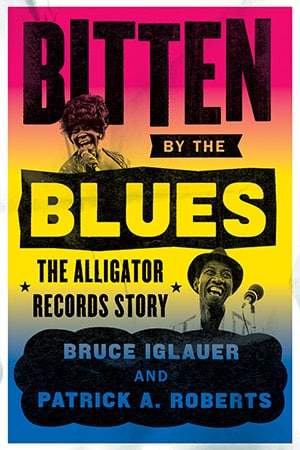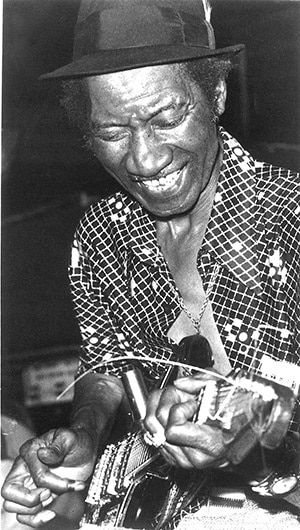
Photo by Paul Natkin
Getting to know enigmatic and historically influential artists such as Hound Dog Taylor, Albert Collins and Koko Taylor would be the greatest experience imaginable for anyone who appreciates blues music.
The litany of musicians who have worked at Alligator Records is amazing and the company’s founder introduces the reader to all of them in the wonderfully insightful and entertaining book “Bitten by the Blues, The Alligator Records Story.”

Co-authored by Alligator’s Bruce Iglauer and Northern Illinois University associate professor Patrick A. Roberts, “Bitten by the Blues” documents the entire history of the record label and the inner workings of the music industry, which has changed dramatically since 24-year-old Iglauer started the business in his tiny Chicago apartment in 1971.
There are many things to love about this book, but it’s the stories about the artists that are most savory. The reader gets to know Lonnie Brooks, Marcia Ball and Johnny Otis and others. Many became famous, others, despite great talent, never received appropriate acclaim.
I’ve had the pleasure of speaking with Iglauer on a few occasions. He writes like he speaks, getting directly to the point. He is eloquent and opinionated. Alligator’s history is meticulously documented, but described concisely and with an entertaining flare. It’s the kind of book a reader doesn’t want to end. And it doesn’t, really, because it can be used to reference esoteric music industry milestones and many visionary artists.
Iglauer writes: “So many older musicians were dying that I began thinking that if I didn’t record them, it wasn’t going to get done. I began seeing the label not only as an extension of my being a blues fan, but also as a mission to capture and preserve an endangered form of music.”
And many, including Roy Buchanan, Michael Burks and Professor Longhair, died early. Iglauer’s friendships are heartfelt throughout the book.
He’s altruistic inside his thick skin and humble enough to reveal missteps. He confides that he possesses a stubborn streak. He described being upset with Luther Allison, the first bluesman he befriended before he started Alligator, for a quarter-century.
He also had a spat with Elvin Bishop (which was not mentioned in the book).
“I was mad at him for a long time,” Bishop told me. “That’s where I got that tune, ‘Don’t Let The Boss Man Get You Down.’ Bruce knows it’s about him, but he likes the song anyway and I don’t understand that. … He’s gotten mellower with age. He’s a beautiful guy.”

Photo by Chris Jacobs
Bishop is among some artists who left Alligator to pursue another label only to return, cognizant that Iglauer looks out for the musicians’ best interest. Iglauer has worked diligently to get royalties to songwriters who, especially in the blues world, are frequently shortchanged.
The author employs colorful descriptions of the blues scene and artist anecdotes to draw the reader closer.
Florence’s Lounge on the South Side of Chicago is described in gritty detail in the book’s introduction. Chicago in 1970 was the hub of seminal African-American blues music, as popular then as is hip-hop today. The author invites you into the club where Junior Wells packed a harmonica and a gun, which he was apt to use.
Iglauer, who has worked with Dr. John, said he was in the right place at the right time when he founded Alligator Records. The label started with the record “Hound Dog Taylor and the HouseRockers,” an eponymous title and a company slogan: Genuine HouseRockin’ Music Since 1971.
Donning high-water pants and drinking highballs, the insouciant Taylor had a visceral sound with his electric slide guitar. He played for enthusiastic crowds in what Iglauer wrote felt like a “parallel universe.”

Photo by Jack Lardomita
“I wanted records to sound like shows sounded in clubs,” Iglauer wrote.
He learned the nuances of every aspect of the music industry and kept up with an innovative business acumen. In 1985, for example, Alligator was one of the first labels to invest in CDs. Vinyl went out of style just a few years later.
He went from being a music fan to a music arranger and finally a producer. Mighty Joe Young guided him in the parlance of the trade. About that time, Willie Dixon would drop by the studio and perhaps look over his shoulder. Iglauer is not a musician and he said he was intimidated by Dixon’s presence and was afraid to ask his advice. The stories here are captivating.
Iglauer took many risks, and Alligator was on the brink on numerous occasions.
This is a book for both musicologists and casual fans. Copious footnotes make it two books in one. Interested in the music-making process by Johnny Winter or Son Seals? Never heard stories about Big Walter Horton or Lonnie Mack? Have you discovered rising blues artists such as Selwyn Birchwood or Toronzo Cannon? Want to find out what Mississippi Fred McDowell and an alligator have in common? Sink your teeth into this book.
— Tim Parsons
- ‘Bitten By The Blues, The Alligator Records Story’
Bruce Iglauer and Patrick A. Roberts
Release: Oct. 30, 2018
Publisher: The University of Chicago Press
